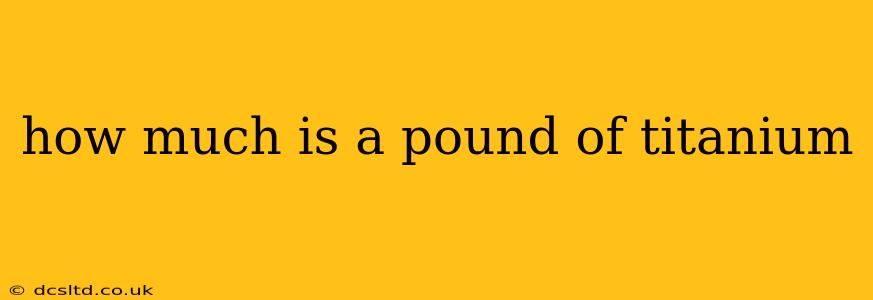How Much is a Pound of Titanium? Unlocking the Price of This Strong Metal
The price of titanium per pound isn't a fixed number; it fluctuates based on several factors. Understanding these influences is crucial to getting a realistic price estimate. This comprehensive guide will delve into the various elements affecting the cost and provide you with a clearer picture of what you might expect to pay.
What Factors Influence Titanium's Price Per Pound?
Several key factors contribute to the fluctuating price of titanium:
-
Purity: The purity level significantly impacts the cost. Higher purity titanium, which is necessary for many applications, commands a higher price. Impurities can affect the metal's strength and other properties, making pure titanium more desirable and expensive.
-
Grade: Different grades of titanium exist, each with varying compositions and properties tailored to specific applications. Aerospace-grade titanium, for example, is more expensive than commercially pure grades used in other industries. These grades differ in their alloying elements and processing, influencing the final cost.
-
Form: The form of the titanium also affects its cost. Titanium can be purchased as ingots, sheets, bars, tubes, powders, or other forms. Processing the raw material into these different forms adds to the expense. For instance, forging a titanium part will be more expensive than simply buying a titanium sheet.
-
Market Demand: Global supply and demand heavily influence titanium pricing. Increased demand from sectors like aerospace, medical implants, and sporting goods can drive prices upward. Conversely, reduced demand can lead to lower prices.
-
Global Economic Conditions: Broader economic factors, including inflation and currency fluctuations, also play a role. Economic uncertainty can lead to price volatility in various commodities, including titanium.
How Much Does a Pound of Titanium Typically Cost?
Providing a single definitive price is impossible due to the fluctuating nature of the market. However, as a general guideline, the cost of a pound of commercially pure titanium can range from $20 to $50 or more. High-grade titanium alloys used in aerospace or specialized applications can be significantly more expensive, reaching several hundred dollars per pound.
It's essential to remember that this is a rough estimate, and the actual price you pay will depend on the factors outlined above.
Where Can I Find Current Titanium Pricing?
To get the most up-to-date and precise pricing information, it's best to contact titanium suppliers directly. Their quotes will reflect the current market conditions and the specific grade and form of titanium you require. Online metal marketplaces may also provide pricing information, but always verify with suppliers before making a purchase.
What Are the Common Uses of Titanium?
Titanium's unique properties, including high strength-to-weight ratio, corrosion resistance, and biocompatibility, make it ideal for various applications:
- Aerospace: Aircraft engines, airframes.
- Medical Implants: Joint replacements, dental implants.
- Sporting Goods: Golf clubs, bicycles.
- Chemical Processing: Equipment resistant to harsh environments.
- Automotive: Exhaust systems, body panels (increasingly).
Is Titanium Worth the Cost?
The high cost of titanium is justified by its exceptional properties. While it's more expensive than many other metals, its strength, durability, and resistance to corrosion often make it the optimal material for applications where performance and longevity are paramount. The cost-benefit analysis will vary depending on the specific application.
By understanding the factors that influence its price and seeking current quotes from suppliers, you can make informed decisions about purchasing titanium. Remember, the price per pound is just one piece of the puzzle; the overall cost will also depend on the quantity you need and the fabrication required.
